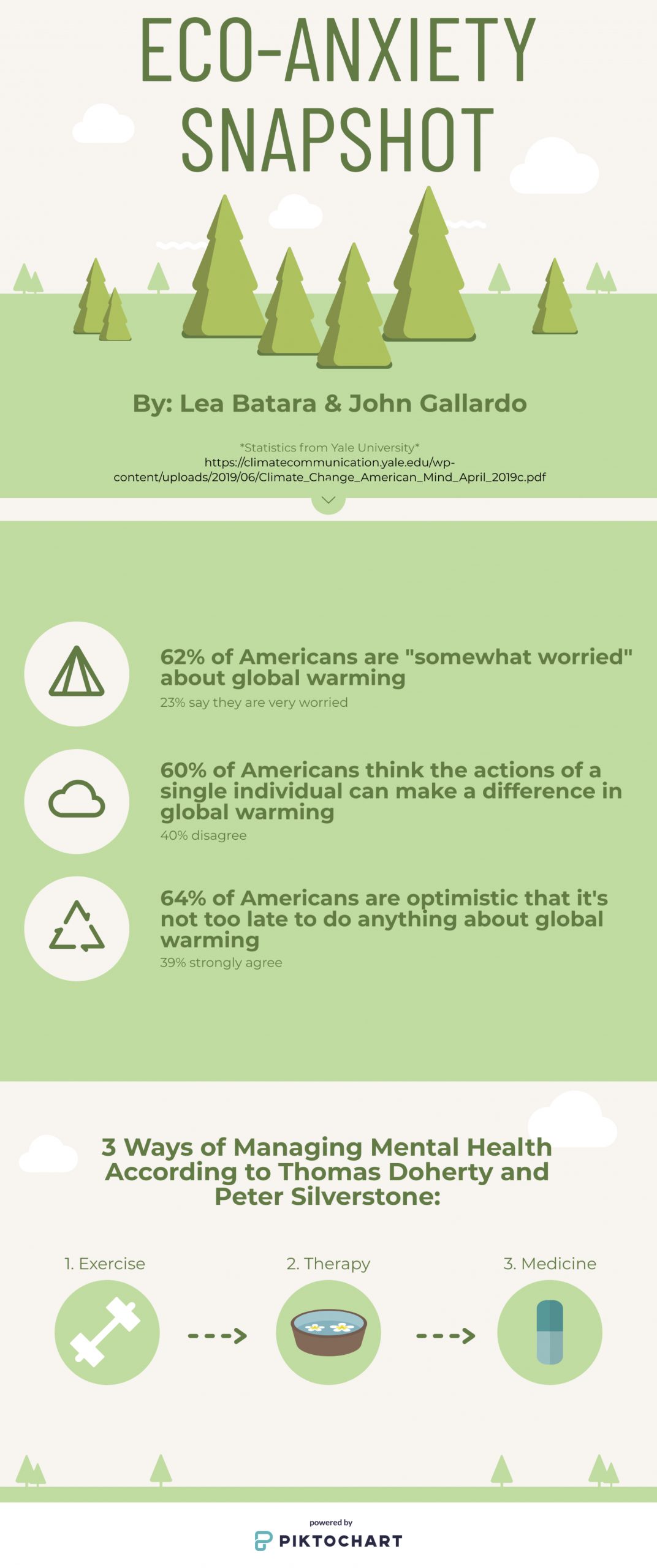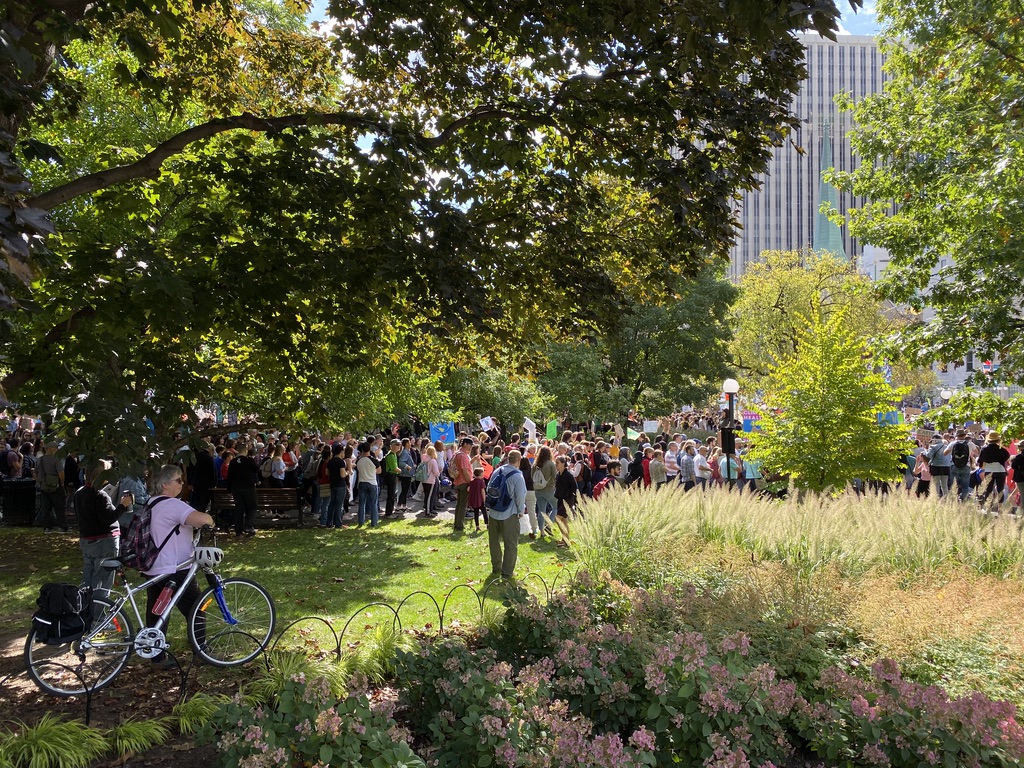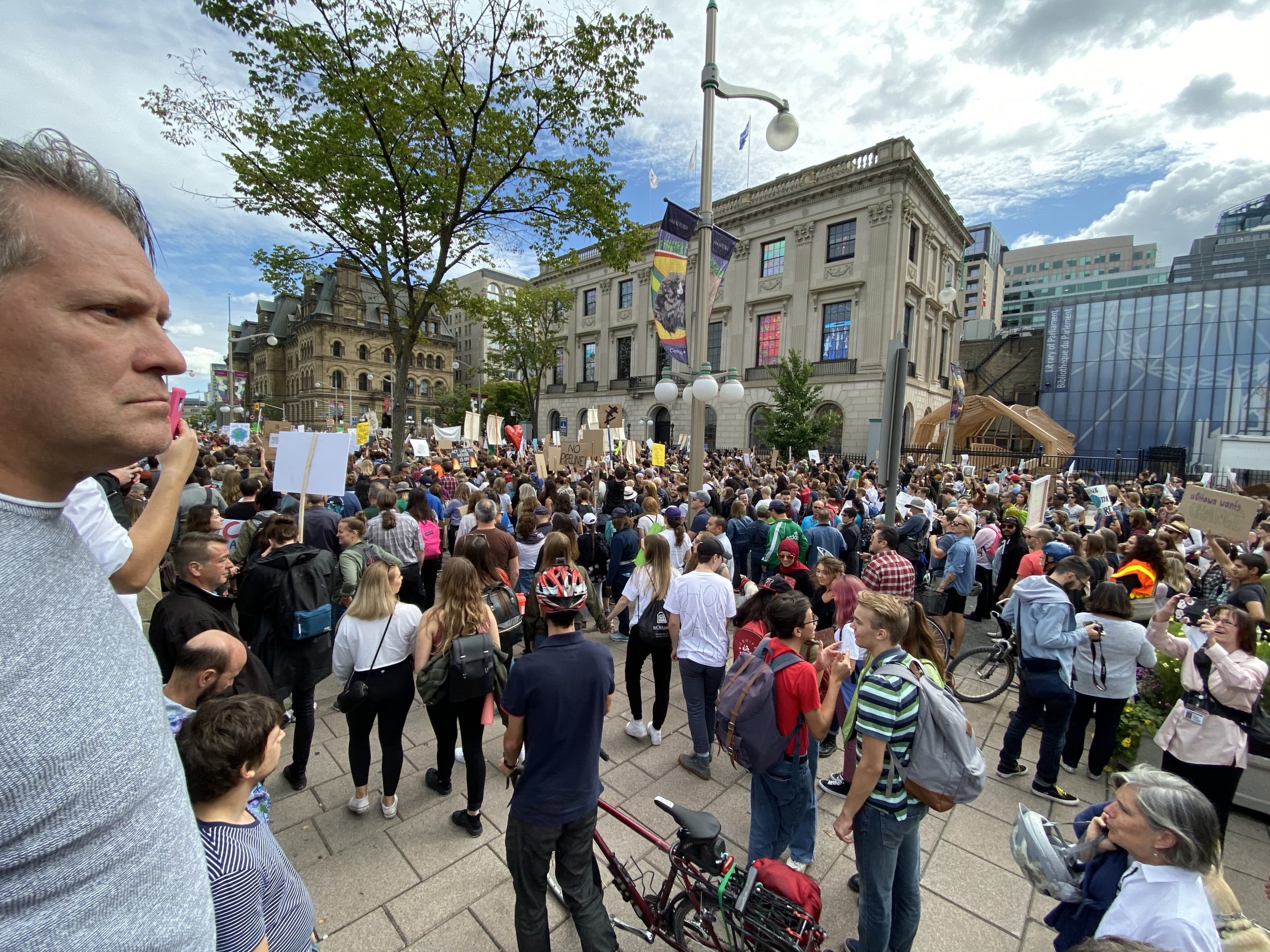Overwhelmed by Eco-Anxiety: The Mental Health Effects of Climate Change
Worries about climate change are affecting mental healthBy Lea Batara & John Gallardo
Ottawa’s climate strike took place September 30, 2019. [Photo © John Gallardo]
Avery Downes said he remembers a time when global warming was a radical subject. He said he did not think it would impact him personally.
“The earliest memory I have, that in hindsight I would classify as a feeling of eco-anxiety, is in elementary or middle school,” the third-year communications and sociology student at the University of New Brunswick said.
“I remember watching one of those BBC Earth documentaries,” he recalled that climate change seemed “like this crazy abstract thing that can never have an impact on you personally.”
“Then suddenly, I remember it clicking in lying awake at night, worrying that my parent’s house was going to flood the next day and stuff like that,” he said, “That’s when I was a kid.”
Now 22-years-old, Downes said eco-anxiety is not a daily struggle, but has made it hard for him to plan his future. “It feels like we’re already, sometimes at least, doomed and we’re just waiting it out at this point.”
Awareness of climate change is leading to anxiety in the general public, with widespread feelings of malaise about the potential of an environmental apocalypse. A recent study found that 62% of Americans are “somewhat worried” about global warming while 23% of them say they are “very worried.” The mental health effects caused by climate change concern has led researchers to coin the term “eco-anxiety.” As climate change fears affect mental health, medical practitioners are coming up with strategies for treating eco-anxiety.
Defining Eco-Anxiety
The American Psychological Association calls eco-anxiety the stress resulting from “watching the slow and seemingly irrevocable impacts of climate change unfold, and worrying about the future for oneself, children, and later generations.”
Although the term has recently surged in popularity, Thomas Joseph Doherty, a licensed psychologist said he remembered a time when it was not.
“When I started working on this 10 or 15 years ago, eco-anxiety was seen as kind of a fringey concept that only environmentalists would experience, but that’s not the case anymore. It’s not considered a fringey concept, it’s a very common experience,” said Doherty.
That being said, there’s no strict definition of eco-anxiety in the Diagnostic and Statistical Manual of Mental Disorders, used by medical health practitioners to make diagnoses.
“Anxiety thrives on a cloud of mystery; we don’t know what’s going to happen. So anxiety’s all about unknown or unclear threats,” said Doherty.
Psychologist Thomas Doherty explained the relationship between climate change and anxiety.
Lawrence Palinkas, a professor at the University of Southern California said that experiences with extreme weather events can result in trauma that feeds in to eco-anxiety.
“The fact that it’s existential, the fact that it’s long term, and the fact that even the immediate disasters can produce traumatic experiences, I think are reasons why mental health is an important outcome related to climate change,” said Palinkas.
But not everyone embraces the term “eco-anxiety,” or thinks it fully captures the depth of issues that arise mentally from environmental concern.
“The problem with eco-anxiety is it’s such an all-encompassing term with no specific focuses,” said Peter Silverstone, a professor of psychiatry at the University of Alberta. “Is it that we are worried about what’s happening to the planet in a general sense? Are we worrying about what’s happening to me and my family in a specific sense? Is the anxiety disorder in any way more meaningful or different than anything else?”

Peter Silverstone, professor at the University of Alberta, explained why he is critical of the term "eco-anxiety".
A 2019 study entitled Climate Change in the American Mind interviewed 1,291 adults aged 18 and older about their perceptions of climate change, including topics such as global warming beliefs, emotional responses to global warming, and global warming and severe weather.
The study, led by Anthony Leiserowitz at Yale University, found that 46 per cent of Americans are either “extremely” or “very” sure global warming is happening, while eight per cent are “extremely” or “very” sure global warming is not happening. The study found that many people are understanding its looming presence, and 38 per cent said they felt personally affected by it.
Extreme Weather and Eco-Anxiety
Eco-anxiety can also affect people differently, depending on where they live and the environmental impacts they’ve already witnessed, according to Woodhall-Melnik and Silverstone. In the past two springs, for example, Fredericton has had severe flooding.
“People have been very, very impacted by the flooding in Fredericton,” Woodhall-Melnik said. She pointed out the recent federal election, where her city’s own Jenica Atwin won the first Green Party seat outside of British Columbia.
Downes said this has caused an internal conflict within himself. “The good social scientist in me is like ‘two years isn’t a trend’, but the pessimist in me says that this kind of thing can be a new normal, and the loss of usable real estate is terrifying,” he said.
According to his research, Silverstone said eco-anxiety and climate change related mental health also have the potential to affect individuals who relocate to areas devastated by natural disasters – a finding that he said surprised him.
“When you move to a neighborhood or an area that has become dysfunctional, you will get impacted by that,” he explained, “as well as seeing people in more distress and seeing the evidence of that disaster, and you can’t escape from it because it’s all around. You go to a place that has gone through a wildfire, and even just driving into the town, all the trees are dead. You’re not able to escape it.”
Julia Woodhall-Melnik, professor at University of New Brunswick, believes that extreme weather events has raised interest in climate change.
Treating Eco-Anxiety
Doherty said that existing clinical approaches can be used to treat eco-anxiety. “You can use an off-the-shelf cognitive behavioural treatment for anxiety with someone experiencing environmental anxiety,” he said. “Any mental health provider can do that work.”
According to Doherty, it is important to validate someone’s beliefs and values when they are developing a sense of identity, whether it’s sexual, gender or cultural, in order to claim that identity.
“We can help people to be empowered to claim their environmental values and their environmental identity. And that gives them a base to work with, and they’re less likely to be discouraged in the short-term,“ said Doherty.
Silverstone shared a similar approach to treatment. “I deal with them the same way I would any other anxiety disorder or PTSD patient, combination approach, therapy, medication, exercise, and so on.”
Silverstone added that there is also a need for more individuals trained in catastrophe-related mental health practices. He said it is important to make these individuals available to the communities that need them.
“In Canada, it would be lovely if we had regional groups trained, so that if something happened they would know what to do, how to set up, how to put in place for communities, short term and long term initiatives,” he said, “groups such as the Red Cross and the government are the ones that should be doing that, but of course neither are. So that’s in an ideal scenario if you want to make a strategic difference.”
“The good social scientist in me is like ‘two years isn’t a trend’, but the pessimist in me says that this kind of thing can be a new normal, and the loss of usable real estate is terrifying,” said Avery Downes, a 22-year-old student at the University of New Brunswick.
Ottawa’s climate strike took place September 30, 2019. [Photo © John Gallardo]
According to Leiserowitz’s climate study, four in ten Americans think the actions of a single individual won’t make any difference in global warming. Addressing this sense of hopelessness is important for managing eco-anxiety, according to Downes, who said the state of government and collective action against climate change “kind of makes me lose faith in humanity’s ability to make good decisions collectively.”
“When dealing with these huge issues, it helps to break it down to something you can affect at a personal level,” said Downes. He suggested that using reusable items, conserving energy, and reducing plastic waste can help make an impact on both the environment and a person’s eco-anxiety.
Downes recounted how he felt after buying his first reusable straw. “It’s like getting a little rush of adrenaline. When I’m drinking with a metal straw or refusing a plastic bag at the grocery store, it feels like I’m doing something good. And it helps personally alleviate the anxiety briefly, but you’re still aware of how small that personal action is.”
“I think it’s about keeping things in perspective as much as you can,” Woodhall-Melnik added, “Trying to do everything that you can to contribute to a healthier environment and healthier world.”
She added that advocating for better environmental change through voting or participating in climate strikes can “contribute to better mental health for yourself.”
Going forward, Woodhall-Melnik is planning a research project that will document experiences of mental health and eco-anxiety in order to develop strategies for coping with the issue. “We want to talk to people about what they think are the best solutions,” She said.
The results of this study may help Downes, and others dealing with eco-anxiety whose outlook on the environment is bleak. “It seems like every few weeks we get some new study or piece of information that is projecting things worse than we thought in the past,” he said. “Every time we learn something new about climate change it seems like it’s worse than we thought it was going to be.”

Ottawa’s climate strike took place September 30, 2019. [Photo © John Gallardo]

Ottawa’s climate strike took place September 30, 2019. [Photo © John Gallardo]
